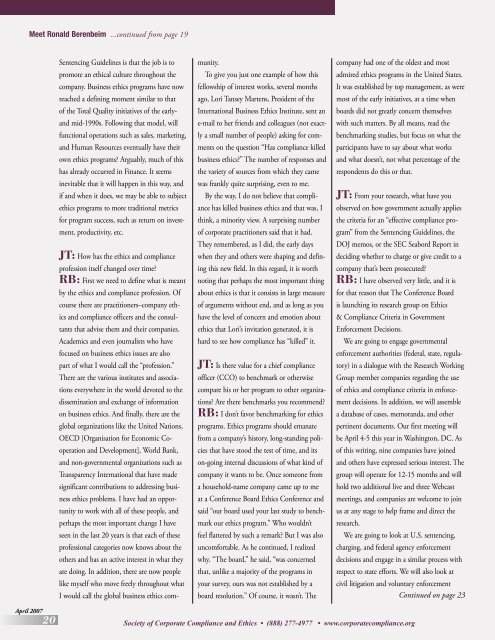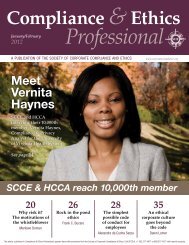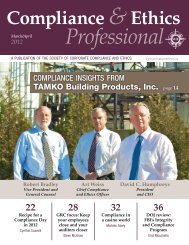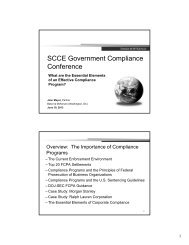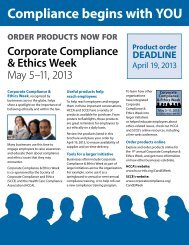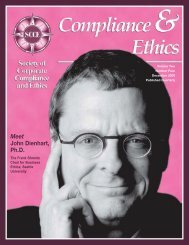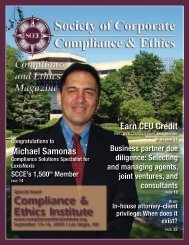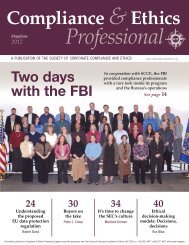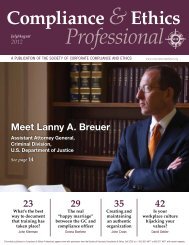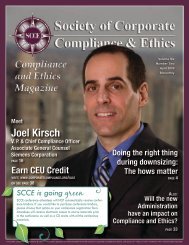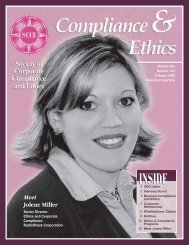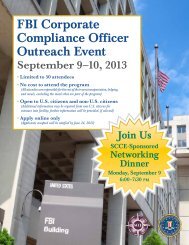Meet Ronald Berenbeim - Society of Corporate Compliance and Ethics
Meet Ronald Berenbeim - Society of Corporate Compliance and Ethics
Meet Ronald Berenbeim - Society of Corporate Compliance and Ethics
You also want an ePaper? Increase the reach of your titles
YUMPU automatically turns print PDFs into web optimized ePapers that Google loves.
<strong>Meet</strong> <strong>Ronald</strong> <strong>Berenbeim</strong> ...continued from page 19<br />
Sentencing Guidelines is that the job is to<br />
promote an ethical culture throughout the<br />
company. Business ethics programs have now<br />
reached a defining moment similar to that<br />
<strong>of</strong> the Total Quality initiatives <strong>of</strong> the early-<br />
<strong>and</strong> mid-1990s. Following that model, will<br />
functional operations such as sales, marketing,<br />
<strong>and</strong> Human Resources eventually have their<br />
own ethics programs Arguably, much <strong>of</strong> this<br />
has already occurred in Finance. It seems<br />
inevitable that it will happen in this way, <strong>and</strong><br />
if <strong>and</strong> when it does, we may be able to subject<br />
ethics programs to more traditional metrics<br />
for program success, such as return on investment,<br />
productivity, etc.<br />
JT: How has the ethics <strong>and</strong> compliance<br />
pr<strong>of</strong>ession itself changed over time<br />
RB: First we need to define what is meant<br />
by the ethics <strong>and</strong> compliance pr<strong>of</strong>ession. Of<br />
course there are practitioners–company ethics<br />
<strong>and</strong> compliance <strong>of</strong>ficers <strong>and</strong> the consultants<br />
that advise them <strong>and</strong> their companies.<br />
Academics <strong>and</strong> even journalists who have<br />
focused on business ethics issues are also<br />
part <strong>of</strong> what I would call the “pr<strong>of</strong>ession.”<br />
There are the various institutes <strong>and</strong> associations<br />
everywhere in the world devoted to the<br />
dissemination <strong>and</strong> exchange <strong>of</strong> information<br />
on business ethics. And finally, there are the<br />
global organizations like the United Nations,<br />
OECD [Organisation for Economic Cooperation<br />
<strong>and</strong> Development], World Bank,<br />
<strong>and</strong> non-governmental organizations such as<br />
Transparency International that have made<br />
significant contributions to addressing business<br />
ethics problems. I have had an opportunity<br />
to work with all <strong>of</strong> these people, <strong>and</strong><br />
perhaps the most important change I have<br />
seen in the last 20 years is that each <strong>of</strong> these<br />
pr<strong>of</strong>essional categories now knows about the<br />
others <strong>and</strong> has an active interest in what they<br />
are doing. In addition, there are now people<br />
like myself who move freely throughout what<br />
I would call the global business ethics community.<br />
To give you just one example <strong>of</strong> how this<br />
fellowship <strong>of</strong> interest works, several months<br />
ago, Lori Tansey Martens, President <strong>of</strong> the<br />
International Business <strong>Ethics</strong> Institute, sent an<br />
e-mail to her friends <strong>and</strong> colleagues (not exactly<br />
a small number <strong>of</strong> people) asking for comments<br />
on the question “Has compliance killed<br />
business ethics” The number <strong>of</strong> responses <strong>and</strong><br />
the variety <strong>of</strong> sources from which they came<br />
was frankly quite surprising, even to me.<br />
By the way, I do not believe that compliance<br />
has killed business ethics <strong>and</strong> that was, I<br />
think, a minority view. A surprising number<br />
<strong>of</strong> corporate practitioners said that it had.<br />
They remembered, as I did, the early days<br />
when they <strong>and</strong> others were shaping <strong>and</strong> defining<br />
this new field. In this regard, it is worth<br />
noting that perhaps the most important thing<br />
about ethics is that it consists in large measure<br />
<strong>of</strong> arguments without end, <strong>and</strong> as long as you<br />
have the level <strong>of</strong> concern <strong>and</strong> emotion about<br />
ethics that Lori’s invitation generated, it is<br />
hard to see how compliance has “killed” it.<br />
JT: Is there value for a chief compliance<br />
<strong>of</strong>ficer (CCO) to benchmark or otherwise<br />
compare his or her program to other organizations<br />
Are there benchmarks you recommend<br />
RB: I don’t favor benchmarking for ethics<br />
programs. <strong>Ethics</strong> programs should emanate<br />
from a company’s history, long-st<strong>and</strong>ing policies<br />
that have stood the test <strong>of</strong> time, <strong>and</strong> its<br />
on-going internal discussions <strong>of</strong> what kind <strong>of</strong><br />
company it wants to be. Once someone from<br />
a household-name company came up to me<br />
at a Conference Board <strong>Ethics</strong> Conference <strong>and</strong><br />
said “our board used your last study to benchmark<br />
our ethics program.” Who wouldn’t<br />
feel flattered by such a remark But I was also<br />
uncomfortable. As he continued, I realized<br />
why. “The board,” he said, “was concerned<br />
that, unlike a majority <strong>of</strong> the programs in<br />
your survey, ours was not established by a<br />
board resolution.” Of course, it wasn’t. The<br />
company had one <strong>of</strong> the oldest <strong>and</strong> most<br />
admired ethics programs in the United States.<br />
It was established by top management, as were<br />
most <strong>of</strong> the early initiatives, at a time when<br />
boards did not greatly concern themselves<br />
with such matters. By all means, read the<br />
benchmarking studies, but focus on what the<br />
participants have to say about what works<br />
<strong>and</strong> what doesn’t, not what percentage <strong>of</strong> the<br />
respondents do this or that.<br />
JT: From your research, what have you<br />
observed on how government actually applies<br />
the criteria for an “effective compliance program”<br />
from the Sentencing Guidelines, the<br />
DOJ memos, or the SEC Seabord Report in<br />
deciding whether to charge or give credit to a<br />
company that’s been prosecuted<br />
RB: I have observed very little, <strong>and</strong> it is<br />
for that reason that The Conference Board<br />
is launching its research group on <strong>Ethics</strong><br />
& <strong>Compliance</strong> Criteria in Government<br />
Enforcement Decisions.<br />
We are going to engage governmental<br />
enforcement authorities (federal, state, regulatory)<br />
in a dialogue with the Research Working<br />
Group member companies regarding the use<br />
<strong>of</strong> ethics <strong>and</strong> compliance criteria in enforcement<br />
decisions. In addition, we will assemble<br />
a database <strong>of</strong> cases, memor<strong>and</strong>a, <strong>and</strong> other<br />
pertinent documents. Our first meeting will<br />
be April 4-5 this year in Washington, DC. As<br />
<strong>of</strong> this writing, nine companies have joined<br />
<strong>and</strong> others have expressed serious interest. The<br />
group will operate for 12-15 months <strong>and</strong> will<br />
hold two additional live <strong>and</strong> three Webcast<br />
meetings, <strong>and</strong> companies are welcome to join<br />
us at any stage to help frame <strong>and</strong> direct the<br />
research.<br />
We are going to look at U.S. sentencing,<br />
charging, <strong>and</strong> federal agency enforcement<br />
decisions <strong>and</strong> engage in a similar process with<br />
respect to state efforts. We will also look at<br />
civil litigation <strong>and</strong> voluntary enforcement<br />
Continued on page 23<br />
April 2007<br />
20<br />
<strong>Society</strong> <strong>of</strong> <strong>Corporate</strong> <strong>Compliance</strong> <strong>and</strong> <strong>Ethics</strong> • (888) 277-4977 • www.corporatecompliance.org


